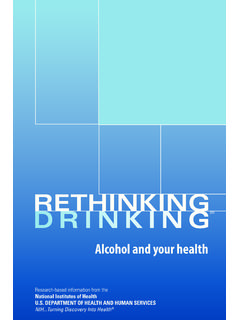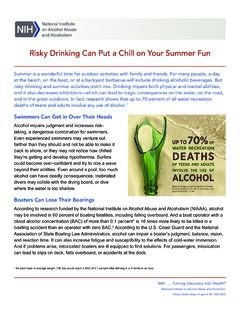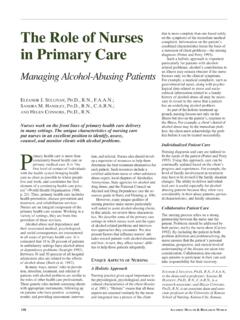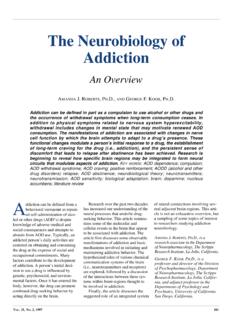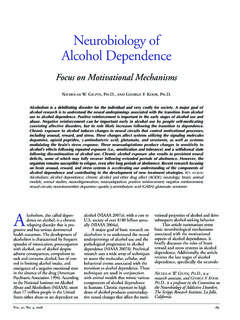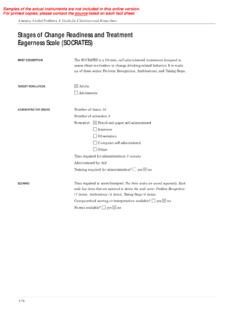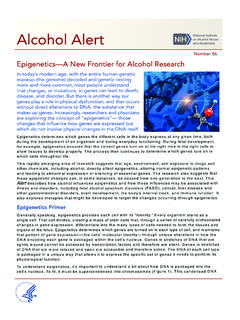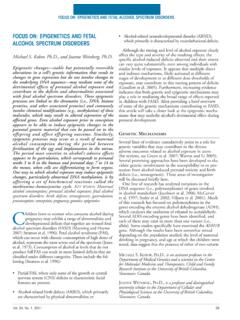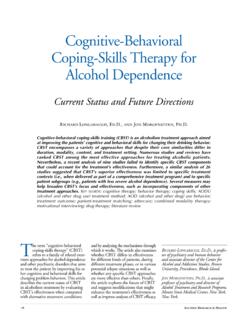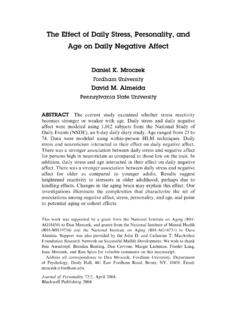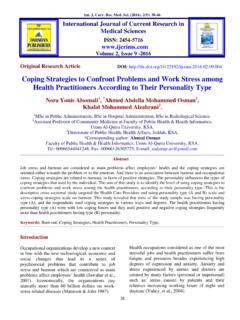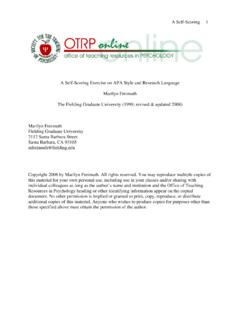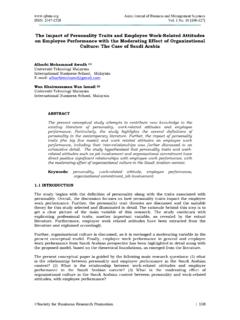Transcription of Understanding Stress: Characteristics and Caveats
1 Vol. 23, No. 4, 1999241 Exposure to stressful situations isamong the most common humanexperiences. These types ofsituations can range from unexpectedcalamities ( , bereavement, naturaldisaster, or illness) to routine dailyannoyances. Regardless of their degreeof severity, however, stressors may pro-mote physiological and behavioral dis-turbances, ranging from psychiatricdisorders (Brown 1993) to immunesystem dysfunction (Herbert and Cohen1993). Stressful events also may pro-foundly influence the use of alcohol orother drugs (AODs). For example, theresumption of AOD use after a lengthyperiod of abstinence may reflect a person sattempt to self-medicate to attenuatethe adverse psychological consequencesof stressors ( , anxiety). Alternatively, stress may increase the reinforcing effectsof article provides a working defi-nition of stress and describes researchon the physiological and psychologicalresponses to different types of stressfulstimuli, focusing particularly on processesthat may be relevant to the developmentof alcohol use.
2 A WorkingDefinitionAs commonly used, the term stressor indicates a situation or event appraisedas being aversive in that it elicits a stressresponse which taxes a person s physio-logical or psychological resources aswell as possibly provokes a subjectiveHYMIEANISMAN, , is a professor at the Institute of Neuroscience, CarletonUniversity, Ottawa, , , is a professor at the School of Psychology and Departmentof Cellular and Molecular Medicine,University of Ottawa, research was supported by the NaturalSciences and Engineering Council stress : Characteristics and CaveatsHymie Anisman, and Zul Merali, to stressful situations is among the most common human experiences. These types ofsituations can range from unexpected calamities to routine daily annoyances.
3 In response tostressors, a series of behavioral, neurochemical, and immunological changes occur that oughtto serve in an adaptive capacity. However, if those systems become overly taxed, the organismmay become vulnerable to pathology. Likewise, the biological changes, if sufficientlysustained, may themselves adversely affect the organism s well-being. Several factors maydictate an individual s response to environmental stressors, including Characteristics of thestressor ( , type of stressor and its controllability, predictability, and chronicity); biologicalfactors ( , age, gender, and genetics); and the subject s previous stressor history and earlylife experiences. Research on the physiological and psychological responses to different typesof stressful stimuli is presented, focusing particularly on processes that may be relevant to thedevelopment of alcohol use disorders.
4 Stressful events may profoundly influence the use ofalcohol or other drugs (AODs). For example, the resumption of AOD use after a lengthyperiod of abstinence may reflect a person s attempt to self-medicate to attenuate the adversepsychological consequences of stressors ( , anxiety). Alternatively, stress may increase thereinforcing effects of AODs. KEY WORDS: psychological stress ; physiological stress ; sensorystimuli; conditioned response; unconditioned response; coping skills; neurotransmitters; brain;neurochemistry; biological adaptation; animal model; genetics and heredity; gender differences;age differences; life event; AODD (AOD use disorders); literature reviewstate of physical or mental tension. Asrelevant scientific data have accumulated,however, a simple, universally accepteddefinition of stress has become increas-ingly article focuses on some of thefactors that may influence the mecha-nisms by which a person responds tostressful situations ( , stressors).
5 Muchof the information presented here is basedon animal research, which can provideessential information not obtainablefrom human studies. However, thehuman stress response is influenced bya host of personality Characteristics andlife experiences that cannot be dupli-cated in animal studies. Other articlesin this issue provide more specificinformation on possible interactionsbetween stress and human behavioralresponses, such as alcohol researchers view the stressresponse as an adaptive mechanismdesigned to maintain the relative stabilityof the body s overall physiological func-tioning ( , homeostasis) in responseto a challenge. However, not all stressresponses are clearly adaptive. Somephysiological reactions to stress thatappear to confer short-term benefits arefollowed by adverse long-term repercus-sions.
6 In other instances, changes thatappear to have adverse consequencesmay, on closer examination, turn outto be beneficial. Finally, some changesthat may have little positive value andno adaptive significance may yet com-prise part of the overall stress ambiguity of the stress responsecan be illustrated by examining the func-tions of cortisol, a hormone released bythe adrenal glands in response to stressfulstimuli (see sidebar, page 247). Amongother functions, cortisol helps promotethe release of energy stores essential forcoping with stress . Yet, cortisol maysuppress the normal functioning of theimmune system, a response that couldtheoretically render the body more sus-ceptible to infectious diseases. However,cortisol-induced immune suppressionalso may serve a protective function(Munck et al.)
7 1984), preventing thedevelopment of illnesses characterizedby immune attack on the body s owntissues ( , rheumatoid arthritis). Evenwhen cortisol release has adaptive con-sequences, the elevated cortisol levelspersist for an extended period, then theadaptive nature of the response may belost and adverse effects may ensue. Thus,what we consider to be an adaptiveshort-term response may subsequentlyprovoke long-term pathophysiologicalconsequences (Sapolsky et al., 1986). Because stressful stimuli often elicitcortisol secretion, some researchers haveproposed the use of cortisol levels as anindex of the stress response. However,not all events perceived as stressful leadto the release of hormones specificallyassociated with stress . Indeed, severalother hormones and similar chemicalmessengers are extremely responsive tostressful stimuli and may influence thecascade of events activated by , positive stimuli may elicitphysiological responses comparable inmany respects to those provoked byadverse events, and increased cortisolrelease is not uniquely provoked by eventsperceived as stressful.
8 For example, ratsthat were offered food in the laboratoryexhibited activation of the hypothalamic-pituitary-adrenal axis (HPA) (see sidebar)identical to that elicited by stressfulstimuli, such as physical restraint(Merali et al. 1998). HPA activationcould arguably represent an anticipa-tory response to any strong stimulus,preparing the animal to respond appro-priately. Alternatively, the presentationof food, at least in animals, may actu-ally threaten to disrupt homeostasis. In that case, the stress response mayhelp mobilize the body s physiologicalresponse to the potential onslaught ofnutrients, which require digestion andabsorption. In addition, food may nat-urally contain or be contaminated byany number of toxic compounds thatmust be eliminated or destroyed ( ,by immune system activity or enzy-matic degradation in the liver).
9 Further-more, in the wild, an animal approach-ing a food source may experience somerisk from either predators or evaluation of these hypotheses iscomplicated by individual differencesin the perception and appraisal of astimulus as of the StressorSeveral factors serve a fundamental rolein determining the nature and conse-quences of the stress response (see side-bar). These factors include inherent features of a given type of stressor as wellas the conditions under which the stressoris encountered ( , the stressor regimen).Evaluating the stress ResponseIn general, stressors may be psychogenicand/or neurogenic. Psychogenic stres-sors are purely of psychological origin( , anticipating an adverse event,experiencing the death of a loved one,or caring for a chronically ill person).
10 Neurogenic stressors involve a physicalstimulus ( , a headache, bodily injury,or recovery from surgery). In addition, environmental stressorscan be classified as either processive orsystemic. Processive stressors are thosethat require appraisal of a situation orinvolve high-level cognitive processingof incoming sensory information. Exam-ples of processive stressors among animalsinclude exposure to new environments,predators, or situations that trigger fearbecause of previous association withunpleasant stimuli ( , fear cues). Incontrast, systemic stressors are of physi-ological origin ( , disturbances of nor-mal bodily metabolism resulting frombacterial or viral infection).Herman and Cullinan (1997) havesuggested that both processive and sys-temic stressors might activate the HPA242 Alcohol Research & Health The human stressresponse is influenced by a host of personalitycharacteristics and life experiences thatcannot be duplicated in animal through distinct but convergingneurological circuits.
